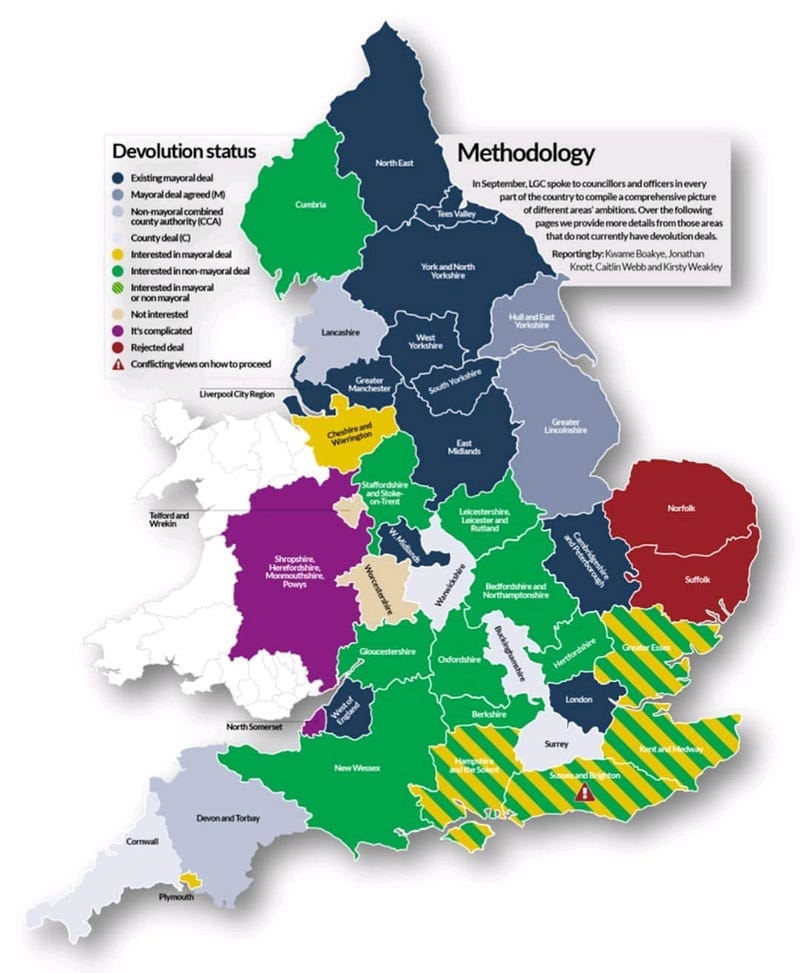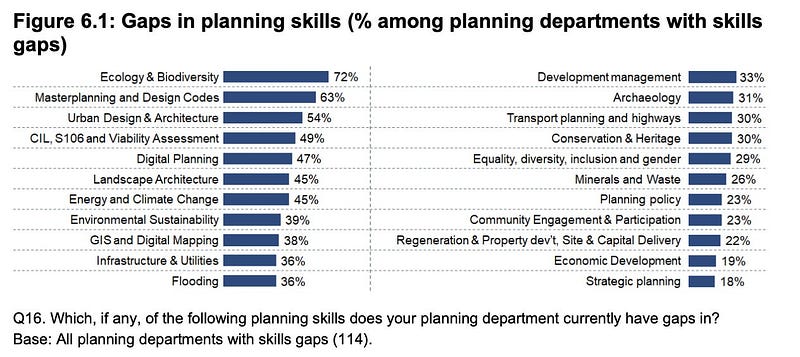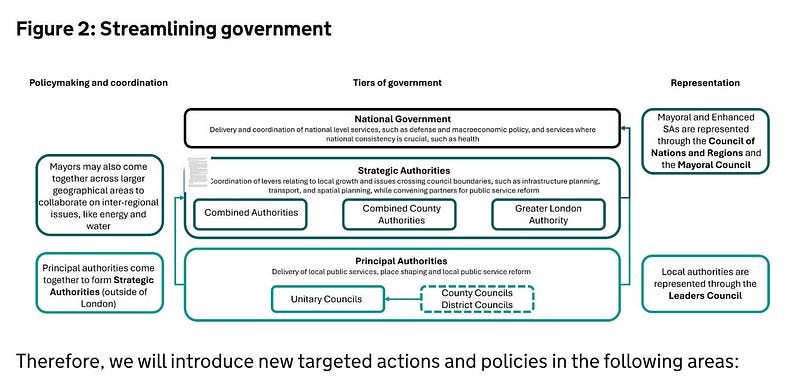Labour have actually got their ducks in a row on growth….
The elusive positive growth narrative is already in the hands of the new government, they just need to frame it…

The elusive positive growth narrative is already in the hands of the new government, they just need to frame it…
I’m not in the habit of being a political cheerleader but peering through the media induced gloom of the first 6 months of the new government there is light. This comes in the form of some of the significant policy changes articulated before Christmas which could set the UK on an unprecedented journey of positive change and growth.
Yes I’m a glass half full type of person but where chaos and apathy exists, opporetunity thrives right?
I currently feel a bit like a pig in the proverbial…. But talking strategic planning, digital and economics is my kind of January (bit warmer though please)
Planning Reform and Devolution
Planning reform, local government reorganisation and devolution are core priorities for MHCLG and in December they published the English Devolution White Paper which provides significant detail of the proposed changes (a job for another blog!). Among many of the interdependent policy changes proposed there will be a reintroduction of strategic planning through mandated statutory spatial development strategies (SDS’s) which will become the responsibility of thetop tier of local government (currently Combined Authorities but to be renamed Strategic Authorities once reorganisation is concluded).
The government has been clear that it will implement a universal system of strategic planning within the next five years. The model that is proposed is the Spatial Development Strategy (SDS), which is well established in London, the London Plan having been produced and continually reviewed over 20 years. As set out at 3.5, where Strategic Authorities exist, they will be responsible for producing or agreeing the SDS for their areas.
There are significant medium and long term oportunities within these policy changes to both improve public services and stimulate growth. However there is an enormous amount of work (and likely time) before we start seeing benefits of many of the proposed changes and there is a real and urgent need to reap some short term gains.
There is a lot of work to do and as much as possible must be started immediately as there are significant capacity and capability gaps already in the sector and the recent retrospective capacity study undertaken by MHCLG is stark reading and doesn’t even speak to the likely new and emerging skills required. In view of this challenge it will be crucial to not reinvent the wheel where we have work that can be built on to fast track some short term wins as well as give certainty to both the market and education sector on future demand.

However, the proposed policy changes are radical and IMHO Governement have rightly framed them as rebuilding solid foundations for public services and growth fit for 21st century challenges. However there are also many welcome nods to digital and data in the Devolution White Paper including new mayoral data councils, mandated data sharing across strategic authorities and expanding the scope of the Digital Economy Act 2017 and this will enable real change to be accelerated.
There is also a very different direction for a planning system which although obscenely rich in data is mired in traditional analogue methods, customs and practice and has generally been slow to adopt digital technologies and data sharing pricatice. The brave new world of planning from 2025 will be digital and data-rich, replacing documents with data and analogue processes with digital ones and allowing for interoperabnility across administartive boundaries, super charge integrations of strategic infrastructure sequencing and housing delivery and build a marketplace of innovation to drive change. Sound amazing right?
Although some of this will be slow to move there is also a significant opportunity right here right now (Cue Fatboy Slim) which could be catalysed in weeks and months rather than months and years, and could be a platform on which to accelerate governments priorities for both housing growth whilst also stimulating a multi billion pound technology market; another big growth manifesto priority.
Proptech and Public Sector as a Catalyst for Innovation
The UK is continuing to experience significant economic challenges, from stagnation to uncertainty in global markets. The January news cycle has not been kind in this regard and questions over how likely growth will be forthcoming this year also adds market uncertainty. Governments response has been to identify AI as a horse to back but this has not gone down amazingly in many areas;

On one side of the discussion there is a lack of understanding of what is actually meant by AI and how it could improve our economic fortunes, whilst on the other side, and as those who are experienced working within digital and technology sectors (especially in public services) know, There are many more foundational (and business critical) data and technology issues to be solved before AI has any beneficial use cases.
However, there is a real opportunity that is dare I say it; is mature enough to be considered real low hanging fruit, which lies within the detail of the policy changes and transformation required by planning reform and devolution, and at the heart of this opportunity is the Proptech market and the advances in digital, data, and AI in the built enviroenments sectors and most importantly in the public sector.

Ironically this sector has been catalysed significantly by the Ministry of Housing, Communities and Local Government’s (MHCLG) Proptech Innovation Fund, which, by supporting startups and technological advancements, has been pivotal in establishing the UK’s Proptech marketplace and has explored some really interesting challenges in driving innovation and efficiencies in how local government can modernise the planning system and accelerate housebuilding.
From automating the complex and time consuming task of dealing with site allocations for Local Plans through to exploring how the use of AI can make time resource efficiencies in summarising planning consultation feedback (Cue…. an actual live AI use case), there is a growing ecosystem of digital, data and technology innovation that could well be a cornerstone for future accelerating governement aspirations for planning reform and housebuilding whilst stimulating growth in a multi billion pound UK technology market.
A Maturing Marketplace
Proptech is a sub-sector in its own right and has reached a critical mass where it is no longer an emerging market but a maturing one capable of significant contributions to the economy. The global PropTech market size was valued at USD 33.57 billion in 2023 and is projected to grow from USD 36.55 billion in 2024 to USD 89.93 billion by 2032, exhibiting a CAGR of 11.9% during the forecast period (2024–2032).
There will be a need for siginficant tech investment to facilitate delivering the digital and data elements of strategic planning and the digital transformation required to deliver effective devolution and local governement reform, including digital products, services and the wrap around consulting required to deliver. Stimulating this market could bring real economic benefits and quickly in comparison with many of the outcomes of an improved planning systems. Notwithstanding this, the implemetation of a digital planning ecosystem within the newly transformed local governement structures will also provide a long term view of demand and skills.
Spatial Development Strategies (SDS) as early use cases
So identifying the growing Protech and digoital planning marketplace as a potential solution is great but what is an early use case problem that could really benefit from building on the innovation already happening in this space?
Enter the new mandating of Spatial Development Strategies. As outlined above these are governements preferred mechanism to implement strategic planning at a sub- regional government level.
These are not ‘Big Local Plans’ and will be something quite different even to the existing SDS in London and the emerging Liverpool City Region SDS. Yes they will need to fulfill a technical stratgic planning role and provide sub regional spatial strategies for growth, but they will also be investment frameworks, infrastructure and capacity platforms, Information and data hubs as well as needing to facilitate the intgration a wide range of other startegies including local plans, local area energy plans, local growth strategies and local nature recovery strategies amongst others.

This means they cannot be anything other than digital. They will need to facilitate integrated data flows and interoperability with other governement and private sector platforms and products, ensure data re-use for continued preparation of evidence bases both for reiteration of their own strategy and the local plans that will hang from them.
They will require live delivery monitoring for success and manging call in of strategic sites applications and help provide data to build other products and services including key areas such as institutional private and public investment alignment against infrastructure capacity gaps.
There will also be a need to build new skills and capability within the strategic authorities that will need to produce and implement SDS’s which will help improve local government capability and can only be a good thing for modernising government; providing better and more transparent public services and placemaking.
Can we just get started on delivery please
So let’s get going right? Yes, but let’s not forget the comms this time and shout the positives and thread the story propery to a better future UK. I realise I’m the eternal optimist but with a fair head wind there is no reason we couldn’t have a couple of pilot SDS areas beginning to work with the proptech market on this in the next few months taking an agile approach to prototyping, sharing testing and iterating so following tranches can build on the lessons from early adopters.
If this isn’t a light in the gloom then I think we’ll struggle hard to find a better one.
P.S. Will do the Devo blog and maybe a bit more on SDS’s in the coming weeks which will help to frame this more coherently.
